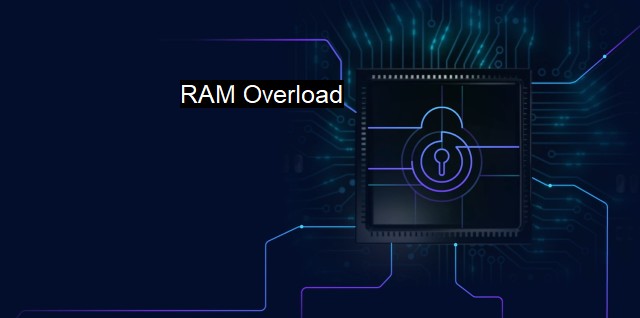What is RAM Overload?
Unleashing the Danger of RAM Overload in Cybersecurity: Risks, Causes, and Mitigation Strategies"
RAM Overload, with refers to the situation where a computer's Random Access Memory (RAM) is over-occupied leading to an inefficient performance or even a system crash. RAM serves as the location where a system stores and retrieves data that is quickly accessible and used by the central processing unit (CPU). When certain cyber threats infect a system, they overload the RAM by using up its resources excessively, causing the system to lag, often slowing to an unbearable pace.At first glance, one might ask why RAM Overload is a cybersecurity issue. It's because many types of malware, such as trojan horses, ransomware, spyware, and even viruses, are designed to overutilize the system's memory, causing an overload. This essentially places the system in a vulnerable position where it becomes easy for the attacker to exploit or manipulate the system, steal sensitive data, or cause intentional damage.
Interestingly, many of these cyber threats operate quietly in the background without the user's knowledge, collecting information, overloading the RAM, and steadily causing damage. cryptojacking is a recent type of cyber threats that use the computer's resources to mine cryptocurrencies without the user's permission. Crypto mining requires a hefty amount of computational resources, and cryptojacking malware can over-consume the RAM and CPU's resources, leading to its overload quickly.
Protection against RAM Overloads becomes critical as cyber adversaries evolve their techniques. They disguise malicious coding within legitimate applications thereby avoiding the detection of traditional anti-virus systems that rely on signature-based detection. Hence, an overloaded RAM can pave the way for ‘advanced persistent threats’ which, once they gain entry into the system’s memory, maintain a stealthy, persistent presence bypassing detection.
This is where the importance of robust antivirus software comes to the forefront. It's not just crucial for scanning and detecting malicious files; it is also essential for managing the resources and ensuring efficient performance of the system. A good antivirus aids in preventing RAM Overload by consistently testing the system’s memory-based vulnerabilities and tracing unusual patterns indicating a malware attack. It can suspend, quarantine, or remove applications identified as potential risks in a bid to maintain the system's integrity and performance.
Employing such cyber hygiene practices as regular updates, running the latest versions of software and operating systems, ensuring segmentation of network variations, and applying rigorous control over app permissions can also keep a check over RAM Overload. Implementing these practices along with advanced antivirus software can you give a dual-layered defense against threats leading to RAM overload.
With the rise of interconnected networks, Internet of Things (IoT) devices, and increasingly complex layers of applications on devices, maintaining sufficient RAM for a system's smooth operation has become even more vital. At the same time, cyber threats keep rising in complexity and sophistication, taking advantage of the system memory to wreak their havoc.
In this landscape, understanding RAM Overload and its implications on cybersecurity is key to developing robust defenses against it. Users and organizations must be aware of the symptoms of a potential RAM Overload, such as slower performance and lagging applications, and take steps to prevent such situations, using effective and updated antivirus tools while observing best practices in computer use and maintenance. Awareness and action are both paramount in the war against rising cyber threats exploiting RAM Overload to cripple systems and seize control.

RAM Overload FAQs
What is RAM overload?
RAM overload occurs when a computer’s RAM or memory usage exceeds its limit. This happens when too many programs or processes are open at the same time or when a single program uses up too much memory.How does RAM overload affect my computer’s cybersecurity?
RAM overload can lead to system crashes and freeze-ups, making it easier for cyber attackers to exploit vulnerabilities in the system. If an antivirus software is unable to run due to RAM overload, it can leave your computer vulnerable to malware and other cyber threats.How can I prevent RAM overload in my computer?
You can prevent RAM overload by monitoring your computer’s memory usage and closing any unnecessary programs or processes. You can also upgrade your RAM if you frequently use resource-intensive applications. Additionally, regularly running maintenance tasks such as disk cleanup and defragmentation can help optimize your system’s performance.What should I do if I experience RAM overload on my computer despite taking preventive measures?
If you still experience RAM overload despite taking preventive measures, you can try reducing the number of programs that automatically launch at startup or upgrade your existing RAM. Additionally, running a full system scan using an antivirus software can help identify and remove any malicious programs that may be causing the overload.| | A | | | B | | | C | | | D | | | E | | | F | | | G | | | H | | | I | | | J | | | K | | | L | | | M | |
| | N | | | O | | | P | | | Q | | | R | | | S | | | T | | | U | | | V | | | W | | | X | | | Y | | | Z | |
| | 1 | | | 2 | | | 3 | | | 4 | | | 7 | | | 8 | | |||||||